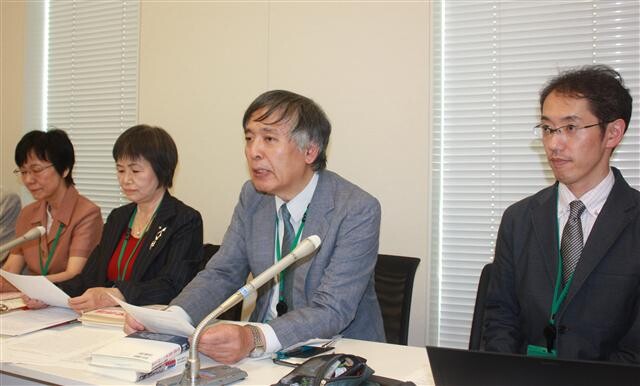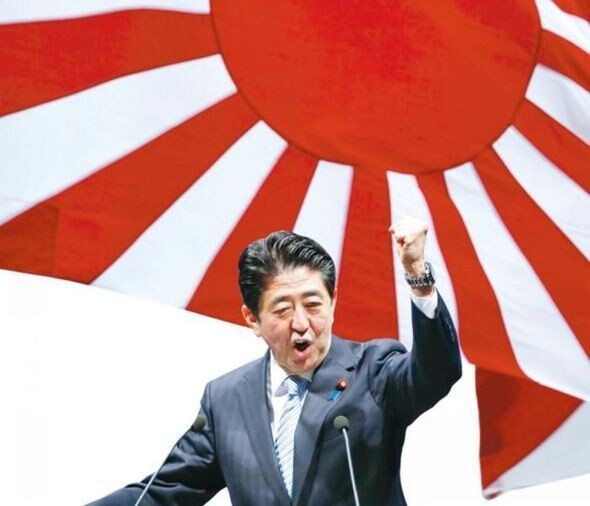hankyoreh
Links to other country sites 다른 나라 사이트 링크
Japanese historians release statement, arguing comfort women were forcibly recruited

Sixteen Japanese historical research organizations issued a joint statement declaring that the comfort women were recruited “against their will” and that this must be seen as “forced recruitment.”
This represents a direct rebuttal of the administration of Japanese Prime Minister Shinzo Abe, which has been distinguishing “compulsion” from “forced recruitment” in an attempt to avoid legal responsibility.
On May 25, the Japanese Historical Society and 15 other Japanese historical organizations held a press conference at the second councilors’ hall at the Japanese Diet in Tokyo.
“Triggered by the retraction of articles in the Asahi Shimbun [about the testimony of Seiji Yoshida, who claimed to have personally kidnapped comfort women] in August 2014, certain politicians and sections of the media have made statements which intend to cast doubt on the wartime issue of the ‘comfort women’ and facts regarding their forced recruitment by the Imperial Japanese Army,” the academics said during the press conference. “It should be understood that forced recruitment of ‘comfort women’ was not limited to cases of straightforward kidnapping, but also included cases of recruitment against the will of the individual.”
The sixteen academic organizations that endorsed the statement on Monday included four of Japan’s preeminent academic associations with more than 2,000 members: the Historical Science Society of Japan, Japanese Historical Society, History Educationalist Conference of Japan, and Japanese Historical Council.
“13,800 historians [including duplicate members] took part in this statement. It is safe to say that the message of the statement represents the general position of Japan’s historians,” said Toru Kubo, chair of the Historical Science Society of Japan, who was at the press conference on Monday.
The release of a statement by academic organizations that represent a wide spectrum of Japan’s historians calling for the question of the comfort women to be left to historians is likely to put the administration of Shinzo Abe, which has been denying the government’s responsibility, in an awkward position.
“As recent historical studies have shown, victims were subjected not only to forced recruitment, but also to conditions of sexual slavery which violated their basic human rights. Furthermore, the ‘comfort women’ system was based on structures of institutionalized discrimination between the colonizer and the colonized that was a fundamental part of everyday, imperialist-Japanese rule,” the statement said.
“Therefore, even if there had been something such as a contract for sex trafficking, ignoring the systems of inequality and injustice [of colonial control] which formed the backdrop to these arrangements, and thereby disregarding the political and social context of the time is to miss the full picture.” In this passage, scholars draw attention to the “structural discrimination” that was undeniably at work in Japan and Korea under Japan’s colonial rule.
“By continuing to take the irresponsible stance of denying the facts of wartime sexual slavery in the Japanese military, certain politicians and sections of the media are essentially conveying to the rest of the world that Japan does not respect human rights,” the statement said. “We renew our demand for all concerned politicians and media outlets to squarely face up to the damage that Japan inflicted in the past, as well as to the victims.”

Historians answer Abe’s call to leave it to experts
“Since the Japanese government said it would leave the issue to the historians, it needs to listen to what historians have to say,” Kubo said at the press conference when asked about the reason for releasing the statement.
It is unlikely that the statement that these sixteen historical organizations released on Monday after half a year’s preparations will be influential enough in the short term to change the historical revisionism represented by Abe. In the long term, however, it is likely to have a significant effect on Japanese public opinion about the issue of the comfort women, which has become a crucial item on the diplomatic agenda for South Korea and Japan.
Abe has often said that historical issues should be left to historians, and now Japan‘s most important historical organizations have banded together to tackle this historical question.
In an open letter released on May 6, 187 historians from various countries, including John Dower, former professor at MIT, said that “historians have unearthed numerous documents demonstrating the [Japanese] military’s involvement in the transfer of women and the oversight of brothels.” Along with the letter, this statement [by Japanese historians] is likely to stand as a stern warning to the attempts of the Abe administration to distort the issue of the comfort women.
There are major differences between the opinions expressed by Japanese historians in the statement and the current position held by the Japanese government.
The biggest points of contention are whether forced recruitment took place, whether the comfort women should be seen as sex slaves, and whether the Japanese government is legally responsible. In the statement, historians argue that the question of forced recruitment ought to be regarded as including women who were recruited against their will.
The term “sex slave,” which the Japanese government has refused to use, appears three times in the statement. “Those who were made ‘comfort women’ fell victim to unspeakable violence as sex slaves,” Japanese historians wrote at one point.
Along with this, the statement complicates Abe’s efforts to use the expression “human trafficking” to portray the comfort women system as having been something that occurred on a private level without any connection to the state. “Even if there had been something such as a contract for sex trafficking,” the historians said, “ignoring the systems of inequality and injustice which formed the backdrop to these arrangements, and thereby disregarding the political and social context of the time is to miss the full picture.”
The historians also drew attention to the structural problem of colonialism, which is located at the heart of the comfort women issue. Regardless of whether the state was directly involved, “the ’comfort women’ system was based on structures of institutionalized discrimination between the colonizer and the colonized,” the statement said.
Previously conducted research on the issue of the comfort women has shown that, in Feb. 1938, Japan’s Home Ministry placed restrictions on Japanese comfort women, saying that they had to be at least 21 years old and that they had to have already worked as prostitutes. However, these provisions were not shared with Japan’s colonies in Korea or Taiwan.
“In the final analysis, a large number of the comfort women were non-Japanese, and an overwhelming percentage of them were Korean,” said Yoshiaki Yoshimi, a professor at Chuo University who is the leading authority on research into the comfort women issue.
The position of Japanese historians who call on the Japanese government to look at the “full picture” of the comfort women issue ties in with the open letter released by Western historians at the beginning of this month. In this letter, scholars said that “the evidence makes clear that large numbers of women were held against their will and subjected to horrific brutality” and criticized the use of “legalistic arguments focused on particular terms or isolated documents to challenge the victims’ testimony.”
“Jumping to the conclusion that the Japanese imperial army was not involved because there are no documents that prove forced recruitment without thoroughly examining research findings about the comfort women reflects a very irresponsible attitude. Politicians should not start talking until they have read the research findings of Japanese historians,” said Hitonari Ishi, the secretary-general of the Historical Science Society of Japan and a signee of the statement.
By Gil Yun-hyung, Tokyo correspondent
Please direct questions or comments to [english@hani.co.kr]
Editorial・opinion
![[Guest essay] The real reason Korea’s new right wants to dub Rhee a founding father [Guest essay] The real reason Korea’s new right wants to dub Rhee a founding father](https://flexible.img.hani.co.kr/flexible/normal/500/300/imgdb/original/2024/0423/8317138574257878.jpg) [Guest essay] The real reason Korea’s new right wants to dub Rhee a founding father
[Guest essay] The real reason Korea’s new right wants to dub Rhee a founding father![[Column] ‘Choson’: Is it time we start referring to N. Korea in its own terms? [Column] ‘Choson’: Is it time we start referring to N. Korea in its own terms?](https://flexible.img.hani.co.kr/flexible/normal/500/300/imgdb/original/2024/0423/3617138579390322.jpg) [Column] ‘Choson’: Is it time we start referring to N. Korea in its own terms?
[Column] ‘Choson’: Is it time we start referring to N. Korea in its own terms?- [Editorial] Japan’s rewriting of history with Korea has gone too far
- [Column] The president’s questionable capacity for dialogue
- [Column] Are chaebol firms just pizza pies for families to divvy up as they please?
- [Column] Has Korea, too, crossed the Rubicon on China?
- [Correspondent’s column] In Japan’s alliance with US, echoes of its past alliances with UK
- [Editorial] Does Yoon think the Korean public is wrong?
- [Editorial] As it bolsters its alliance with US, Japan must be accountable for past
- [Guest essay] Amending the Constitution is Yoon’s key to leaving office in public’s good graces
Most viewed articles
- 1[Guest essay] The real reason Korea’s new right wants to dub Rhee a founding father
- 2Terry Anderson, AP reporter who informed world of massacre in Gwangju, dies at 76
- 3Why Korea shouldn’t welcome Japan’s newly beefed up defense cooperation with US
- 4[Column] ‘Choson’: Is it time we start referring to N. Korea in its own terms?
- 5Senior doctors cut hours, prepare to resign as government refuses to scrap medical reform plan
- 6Opposition calls Yoon’s chief of staff appointment a ‘slap in the face’
- 7[Column] The clock is ticking for Korea’s first lady
- 8New AI-based translation tools make their way into everyday life in Korea
- 9[Editorial] Japan’s rewriting of history with Korea has gone too far
- 10[Column] Are chaebol firms just pizza pies for families to divvy up as they please?